Which President Changed His Ideas On Civil Service Reform When He Gained The Presidency?
Days before he was elected to the Russian presidency in 2000, Vladimir Putin told the BBC that Russia was "part of European civilization" and that he "would not rule out" the possibility of it joining Nato.
"I cannot imagine my own country in isolation from Europe and what we ofttimes call the civilised globe," said Putin, who was still acting president after Boris Yeltsin'due south sudden resignation on New Twelvemonth'south Eve 1999.
A generation later, equally Putin marks the 15th anniversary of acceding to power on 7 May 2000, Russian federation has changed beyond all recognition from the chaotic, open free-for-all information technology was under Yeltsin. Internationally it faces isolation, sanctions, a new cold war even. At domicile, despite economical decline Putin enjoys maybe the highest popularity rating of whatsoever Kremlin leader – an blessing rating that topped 86% in February.
Dear him or detest him, it's hard to deny that Putin has made a huge impact on his state and the world.
Ukraine, Georgia and the 'near abroad'
The "near abroad" just got a fiddling nearer. The Ukrainian conflict has ruptured relations betwixt Russia and the w over the past year, only in fact it is only the latest example of Putin asserting Russia'due south "rights" in its former backyard, known in Russian federation as "the near away". Those who were surprised by Putin'southward annexation of Crimea and the subsequent Russian-fuelled conflict in eastern Ukraine should have remembered: six years earlier he set the mould for the "Putin doctrine" in Georgia. Russian federation would use troops to protect its interests in a sphere of influence increasingly hemmed in by Nato'south advance. The The states blinked showtime.
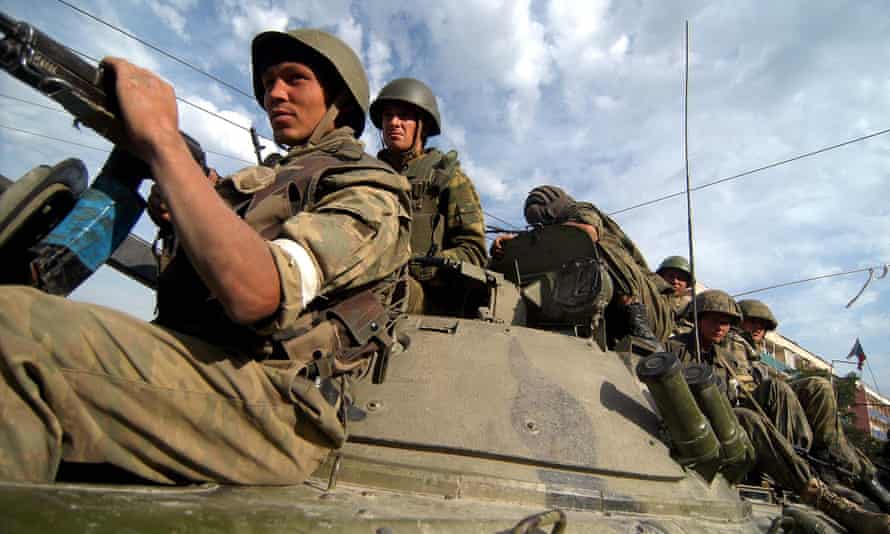
The Ukraine gambit has been more than risky. Public opinion certainly favoured the Crimean manoeuvre, simply in Donetsk and Luhansk, Russians have died.
Sanctions as well equally falling oil prices have hurt the Russian economy. Putin has his state on his side, for at present, and has achieved his strategic aims, but not without some cost.
Opposition to Nato
Under Yeltsin, Russian pursued a policy of grudging cooperation with Nato. All that inverse under Putin. Since his first interview with the BBC, Putin has insisted that Nato's e expansion represents a threat to his country. Now Moscow finally has the military musculus to push dorsum. According to a November written report on the rise of shut military encounters between Russia and the w, Nato states had scrambled fighter jets to intercept Russian aircraft more than 100 times as of late October, more than than iii times more than in 2013. The newly aggressive stance has worried Poland and the Baltics, every bit well as the Nordic countries. Even Sweden and Republic of finland have started musing aloud about joining Nato.
Putin's position has huge bankroll in Russia – and plenty of back up from those in the w who believe that Nato only exists to bargain with the insecurities that its beingness creates.
A suspected Russian submarine in the Stockholm archipelago prompted a huge hunt by the Swedish navy in October, and a Scandinavian Airlines airplane with 132 passengers taking off from Copenhagen in March most collided with a Russian reconnaissance shipping that had not transmitted its position.
Autocracy
While Putin may have flip-flopped on economical issues, he has consistently moved toward greater consolidation of his ain ability. In 2004, he signed a police allowing the president to engage regional governors, a privilege he mostly retains despite reforms prompted by street protests in 2011-12.
Putin's famous "castling" with Dmitry Medvedev allowed him to return to the presidency in 2012. In the meantime, Russian federation'southward lapdog parliament had passed a law in extending the presidential term from iv to six years. Putin has said he won't rule out running again in 2018, and if he wins, his time in ability could surpass that of Leonid Brezhnev – 18 years – and fifty-fifty Joseph Stalin.
Cult of personality
Well, not quite a cult. But don't underestimate how much damage ten years of Yeltsin, his antics, ailments and slurring on television, did to Russians and their view of themselves. Putin has given them something much more than in keeping with the macho spirit of the Russian muzhik: a horse-riding, bare-chested, tiger-wrestling, clean living, straight-talking activeness man.
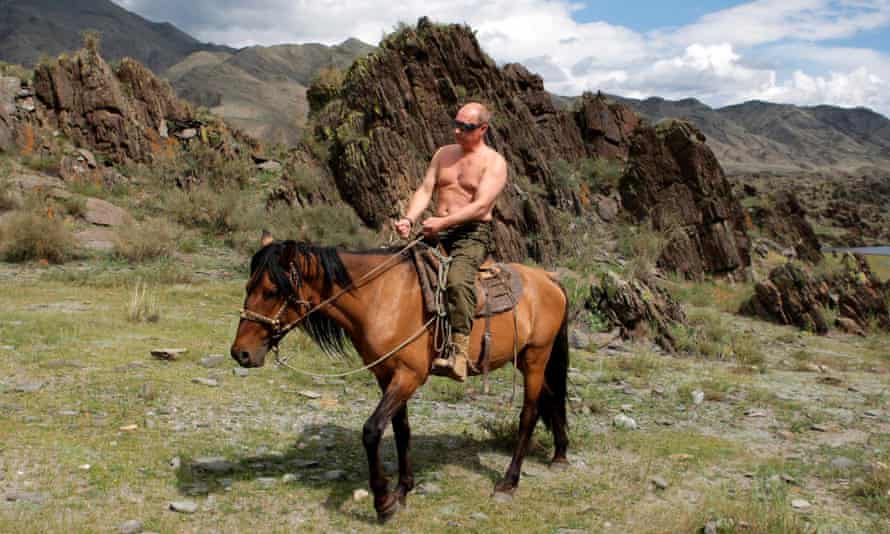
At least, that'due south what his epitome makers have done for him. Backside the scenes, who knows? Rumours fly thick and fast about his affection for Botox and his alleged relationship with an Olympic gymnast half his age. These are stories that don't make the Russian printing.
Information technology's the economic system, durak!
When Putin arrived in role, Russian federation was just emerging from the disastrous market reforms of the 1990s and the 1998 financial crisis. The new president had no 1000 economical vision: while he slashed taxes to do good concern, he besides renationalised fundamental sectors, starting with the breakup of political foe Mikhail Khodorkovsky's Yukos oil company in 2003. Still, unused manufacturing capacity and rising prices for oil, Russia'due south chief consign, helped usher in an era of unprecedented prosperity that Putin is notwithstanding remembered for, with existent disposable income doubling between 1999 and 2006.
The global financial crisis brought this growth crashing to a halt. While oil wealth had stimulated growth, little progress had been made in diversifying the economy or modernising Russian federation's industries. Even before oil prices dropped and western sanctions over the Ukraine crisis came into effect in 2014, economists were predicting long-term stagnation.
Although Putin recently called his government'south response to the rouble crisis of late 2014 "optimal", many blame the key banking company's sudden interest rate rises and a shady bond issue past state oil company Rosneft for sinking the national currency.
Equally former finance minister Alexei Kudrin reminded Putin during the president's annual call-in show in Apr, the vii% annual GDP growth at the end of his kickoff presidential term fell to just 0.half-dozen% in 2014, and the country's economy is expected to enter recession this yr. Not a great outcome for a man whose initials – VVP – stand for GDP in Russian.
Population growth?
Putin took over a country whose population was falling at an alarming rate. Russia – a population of nearly 150 million people at fourth dimension of the fall of the Soviet Union – was losing people at a rate of about a million a twelvemonth, a combination of a reluctance to procreate and a proclivity, from men at least, to dice young.
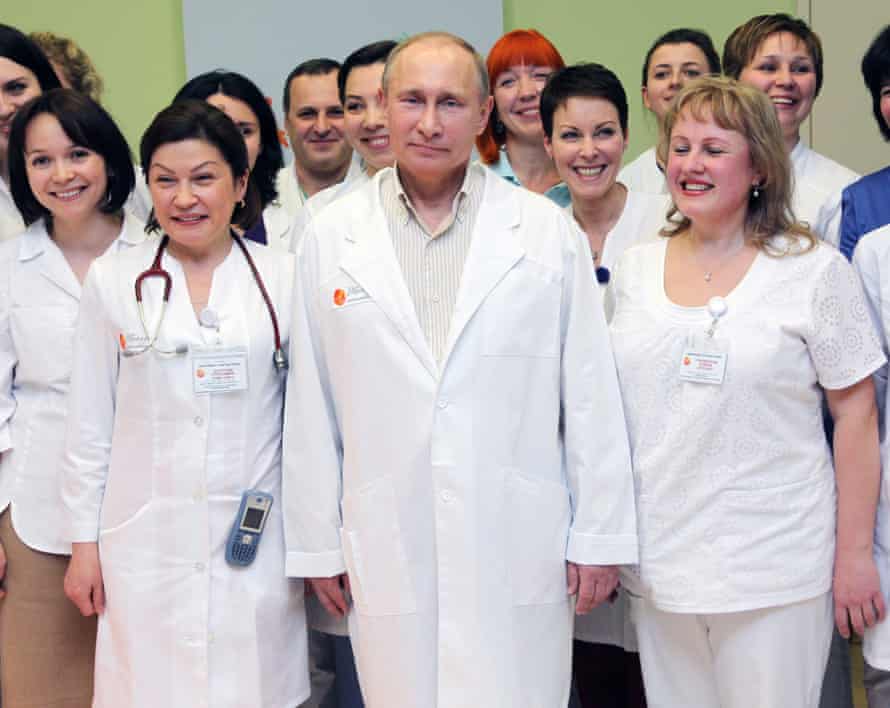
But the pass up gradually bottomed out, and in 2010 the population started growing over again. The surreptitious to this reversal was largely economic: every bit their financial situation improved during Putin'south reign, Russians began having more children. Co-ordinate to the state statistics service, the country now has more than 146 one thousand thousand people, up from 142 meg in 2008. Even if you don't count the 2.2 million people information technology gained by annexing Crimea, information technology'southward all the same a positive trend.
But at present that the econom ic outlook is uncertain, that trend may be reversing, with births down by 4% in January.
Pin to Asia
E'er a vocal proponent of a multipolar world, Putin has shifted in recent years toward greater economic and military cooperation with Asian countries, whose growing economies are hungry for Russia's energy and whose governments are less judgmental of its homo rights record. Last twelvemonth, he brokered two huge deals to supply Mainland china with gas, one worth $400bn. (First he has to build a pipeline through two,500 miles of mountains, swamps and seismic hotspots.) Subsequently this calendar month, the ii countries will hold joint naval exercises in the Mediterranean Bounding main. He'southward also exporting Russian railroad engineering to Democratic people's republic of korea, which in the meantime has been opening quasi-slave-labour logging and farming camps in Russia's far due east.
Worsening relations with the European union, which in December forced Russia to abolish a pipeline to Bulgaria that was already being built, has only sped up its pin to Asia.
Crackdown
With the imprisonment of oil tycoon Mikhail Khodorkovsky and the assassinations of several prominent opposition voices, Putin'south Russia was already a place where dissent was not particularly welcome.
Simply the pivotal moment came during the winter of 2011-12. Rolling opposition protests briefly threatened an Arab bound of sorts in Moscow. Putin moved apace. A slew of criminal cases on dubious charges were opened against anti-corruption campaigner Alexei Navalny and 27 protesters from the May 2012 Bolotnaya Square rally.
Since Putin's render to the Kremlin in 2012, new laws have raised the fines for those taking role in protests not sanctioned by the regime to as much every bit 1m roubles (£13,000) or up to v years of forced labour or prison for echo violations.
Amid growing patriotic fervour and rhetoric most traitors– Putin suggested in December that opposition members could be function of a "fifth column" undermining the country – the popular opposition motility is all but dead. Symbolically, i of its leading voices, former deputy PM Boris Nemtsov, was assassinated in front of the Kremlin in February. The offense was allegedly committed by security officers loyal to Chechnya's ruler, Ramzan Kadyrov, who was awarded a medal past Putin before long later.
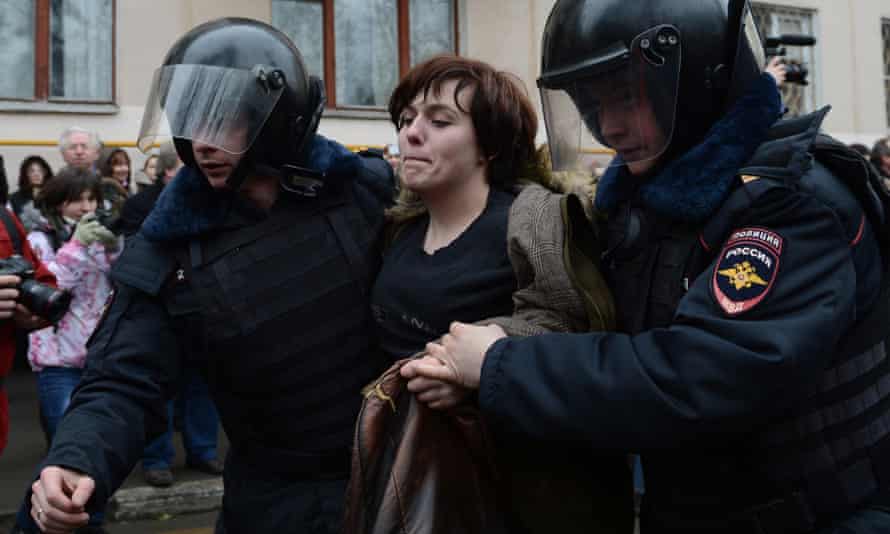
In Putin's 3rd term, government accept also tightened the screws on non-governmental organisations that receive funding from abroad, whom Putin has previously disparaged equally "jackals" and traitors. According to a 2012 police, such groups must characterization themselves "foreign agents" in their publications and submit to audits, with stiff fines for failure to come across these onerous requirements.
Once an haven of free spoken communication, the Russian internet is now subject to vague laws that permit the government's communications watchdog to cake sites deemed to publish "extremist" material or content harmful to children. As a effect, several major opposition sites were blacklisted in 2013. According to a 2014 police, popular bloggers must at present annals their truthful identities with the state and confront potential libel suits.
The crackdown has, of grade, extended to the Chechen separatists whose destruction ("Should we grab them in a shithouse, we'll whack them in a shithouse!" he once said) was Putin's showtime existent claim to leadership fame. His campaign against the Islamic insurgency in the wider Due north Caucasus region has led to a reduction in violence – but also to a litany of human rights abuses.
'Moralistic' vision
Alongside a crackdown on the opposition, NGOs and the net, Putin's third term has seen a wave of legislation inspired past his vision of Russian federation as a bastion of traditional morals. The near egregious example was the 2013 ban on gay propaganda, which LGBT rights activists say has contributed to a rise in homophobic harassment in the country, including vigilante group violence.
Nether Putin, the 2d world state of war has become a patriotic rallying point, and a 2014 constabulary criminalises the "distortion" of the Soviet Union'south part in the war. Other legislation imposed fines for the utilise of expletives on television, radio and in films shown in theatres, cartoon criticism from musicians and directors.
A multipolar world?
The charitable view of Putin's foreign policy is that he stands upwardly to western hegemony and, with Red china, acts as a residue to the overweening military and political power of the US. If Yeltsin was consistently in America's pocket, then Putin has been on its dorsum.
However, while the Russian president can plausibly claim to accept history on his side in opposing Washington over the Iraq and Afghanistan wars, his stance on Syria and unwavering support for Bashar al-Assad has been open to greater criticism.
It'southward not all about opposition. Putin'due south diplomats take worked constructively with international allies and adversaries to aid bring Islamic republic of iran in from the cold, and – until recently at least – to work at farther nuclear arms reductions.
Londongrad
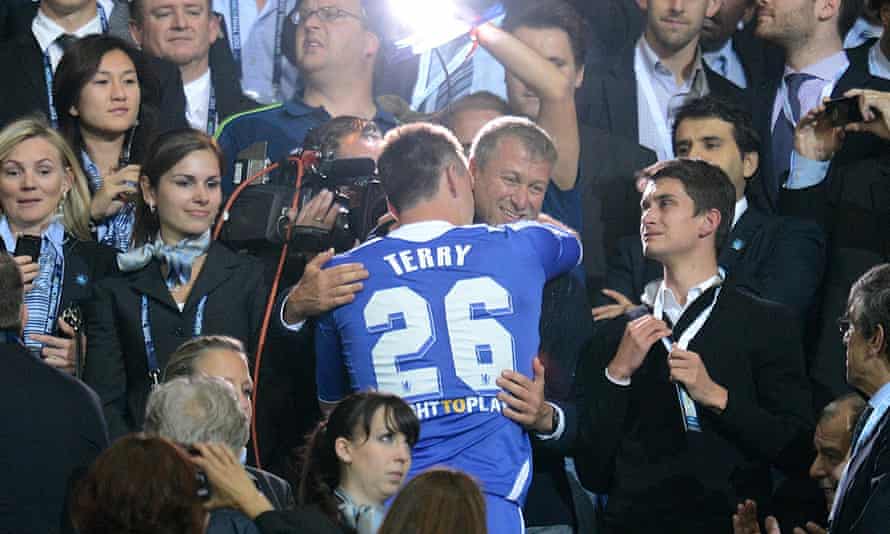
Under Putin, the Anglo-Russian human relationship has turned into a paradox: at the aforementioned fourth dimension as official relations hit new, icy depths over espionage and murder, record numbers of Russians and their greenbacks were flooding west – and London was their favourite 2d home.
Oligarchs parked their kids in swanky schools, listed their companies on the stock market and bought football clubs, some perchance as an insurance policy, others because it became ultra-fashionable. But London besides became a bolthole for the out of favour, home to an entire dissident community of anti-Putinistas, farther straining relations between London and Moscow.
New-found sporting prestige
The Sochi Wintertime Olympics in 2014 were a triumph for Putin, who had campaigned aggressively to host the event. Russian federation won the medal count with 13 golds, and no major security breaches or organisational embarrassments – as well a few unfinished hotel rooms – marred the event. Joined by faded action star Steven Seagal, Putin afterwards presided over a Formula One race held on a class built around the Olympic park, and in 2018, the country will host the Fifa World Cup.
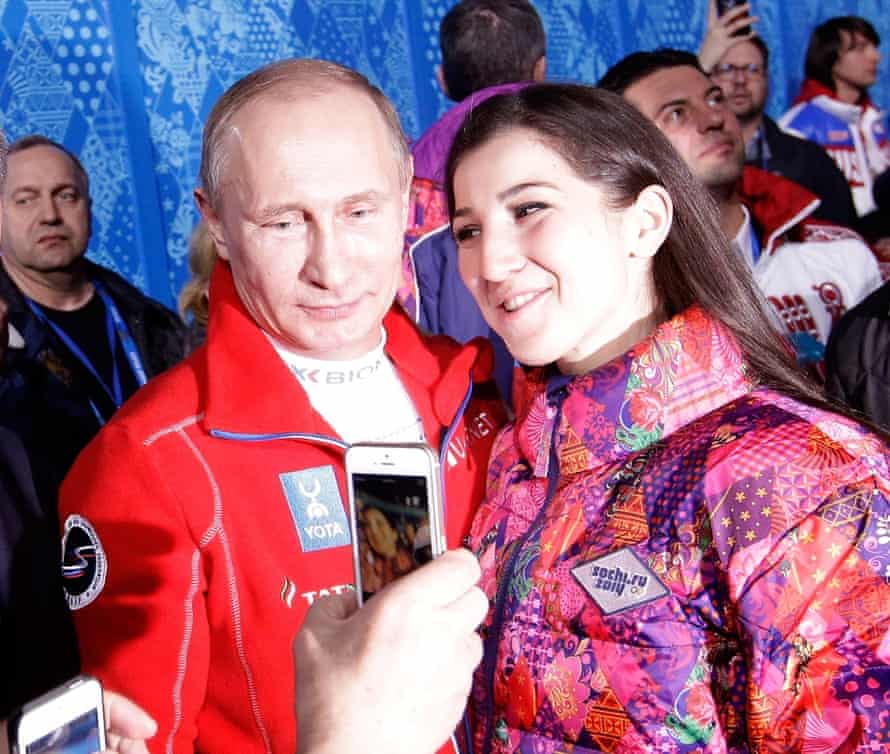
Just such state-backed events involving huge construction projects accept been a goldmine for crooked officials in Russia. Nemtsov, who had written a scathing report on the preparations for the Sochi Olympics, estimated that $30bn of the record $50bn spent on the games had been lost to corruption. This was in addition to the poor labour atmospheric condition and environmental damage reported during pre-Olympic construction. Fifa'due south lead investigator quit after the football game system cleared Russia of allegations of corruption in the Globe Cup bidding process, accusing it of a "lack of leadership".
Corruption
Despite a land campaign against corruption, Putin'due south Russia has failed to shake off accusations of being fundamentally dishonest. In 2014, Russia was ranked 136 out of 175 in Transparency International's corruption perceptions index, down from 127 in 2013 and 133 in 2012. The Organised Criminal offense and Corruption Reporting Project also named Putin its "person of the twelvemonth" after its investigations constitute that he had engaged with the mafia to create what it called a "military-industrial-political-criminal" complex to launder coin and promote his interests away, including in the transfer of weapons to rebels in eastern Ukraine.
Although little information is available on his personal wealth, many expect that Putin himself has benefited from state corruption. Allegations have swirled for years that an extravagant palace being built on the Black Sea coast – reportedly guarded by the presidential hush-hush service and now owned by a Putin confidant – secretly belongs to him and was paid for with embezzled funds.
Military
Putin inherited an army that was not fit for purpose. During his second term, he set out to reform the outdated conscript-based army, a process that merely quickened after its unconvincing victory in the Georgian war. Russian federation now spends a higher percentage of its Gross domestic product on defence than the United States, and has allocated a record $81bn in 2015.
While the increased spending and reorganisation has created a force able to react relatively quickly when one-time Soviet republics get too uppity, new equipment – in detail a new stealth fighter and a next-generation tank – are still on the way. It has non helped that France recently withdrew its offer to sell Russia two Mistral warships.
New propaganda
Fifty-fifty as independent media found themselves on the run, Putin appointed Dmitry Kiselyov, a tv set presenter known for his anti-American conspiracy theories, head of the land news agency Rossiya Segodnya. In this mail, Kiselyov has overseen an expansion of Sputnik News and Russian federation Today, which peddle the Kremlin's talking points in foreign languages. While state-backed news outlets are aught new, the Kremlin'southward new propagandistic media have been criticised for their journalistic standards. In November, the Britain media regulator Ofcom threatened RT with sanctions over news reports that failed to comply with impartiality rules.
Source: https://www.theguardian.com/world/2015/may/06/vladimir-putin-15-ways-he-changed-russia-world
Posted by: rachalbeenarile.blogspot.com


0 Response to "Which President Changed His Ideas On Civil Service Reform When He Gained The Presidency?"
Post a Comment